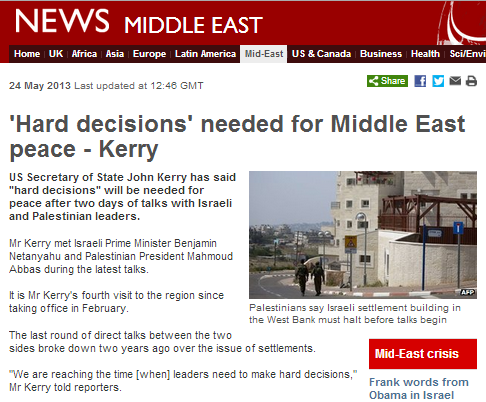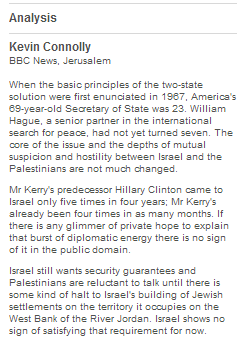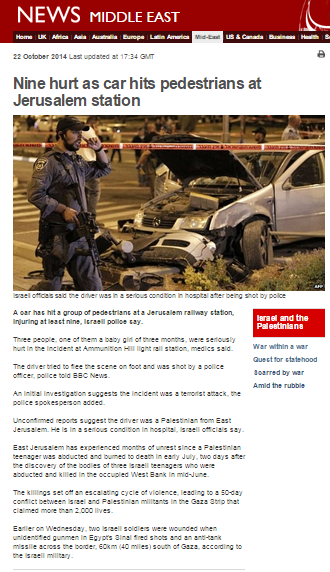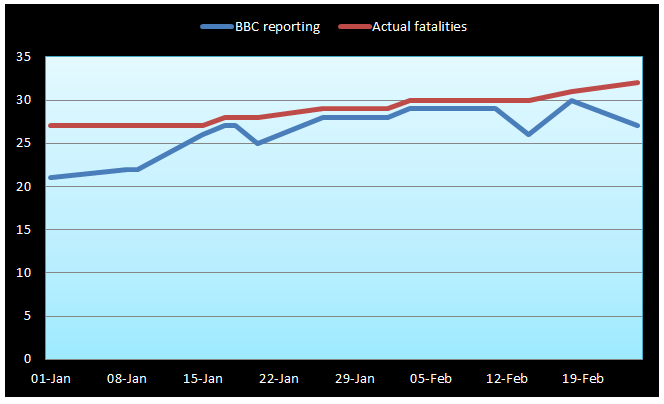An article entitled “ ‘Hard decisions’ needed for Middle East peace – Kerry“ appeared on the Middle East page of the BBC News website on May 24th 2013.
The article – which ostensibly reports on the subject of the recent visit to the region by US Secretary of State John Kerry – devotes a considerable amount of space to promoting the habitual BBC mantras of ‘settlements as an obstacle to peace’ and ‘settlements are illegal under international law’. However, the telegram-style clichés repeated in this article, as in countless others, not only fall short of contributing to BBC audiences’ gaining comprehensive understanding of the issues at stake, but actively prevent them from doing so.
“The last round of direct talks between the two sides broke down two years ago over the issue of settlements.”
This pro forma statement is so well-worn that BBC editors have apparently not noticed that it is no longer accurate even from the point of view of its time-scale. The Palestinian Authority refused to continue direct negotiations in late September 2010 – two years and eight months ago. The statement fails to inform readers that prior to that break-down in talks, a ten-month freeze on construction had been implemented by Israel in order to encourage the renewal of discussions, but the Palestinian Authority failed to come to the negotiating table for nine of those ten months and then used the end of the construction freeze on September 26th 2010 as a pretext to refuse to continue talks.
“Mr Kerry called on Israel to prevent further settlement building where possible in the West Bank but stopped short of calling for a total freeze.”
This statement misleads BBC audiences by implying through the use of the phrase “further settlement building” that new towns and villages are being constructed in Judea & Samaria and by failing to make clear that in fact the issue is building within the municipal boundaries of existing communities. 
“Palestinian officials want all settlement activity in the West Bank to stop before they return to negotiations with Israel.
Israel says it will not accept any preconditions for talks.
Last week the Israeli government took steps to authorise four Jewish settlement outposts in the occupied West Bank.
Israeli settlements in the West Bank are considered illegal under international law, although Israel disputes this.”
As usual, the BBC conceals from its audiences the fact that there are differing legal opinions on the subject.
“The main issues to be addressed in a peace agreement include borders, the future of Jewish settlements, the status of Jerusalem and fate of Palestinian refugees.”
Note the repeated use of the term “Jewish settlements” rather than ‘Israeli’. Communities in Judea & Samaria were built under the auspices of successive Israeli governments – all of which were democratically elected by the entire spectrum of the Israeli people – including the 20% or so who are not Jewish.
An average reader of this article would go away convinced that building in communities in Judea & Samaria is the main issue preventing a peace agreement between Israel and the Palestinians. So let’s take a look at just some of what the BBC has to airbrush out of its ‘peace process’ narrative, as presented in this article and many others, in order to promote that chimera to its audiences.
1. The Palestinian Authority’s insistence on the ‘right of return’ for refugees: a scenario which would bring about the end of Israel as a Jewish state.
2. The Palestinian Authority’s refusal to recognize Israel as a Jewish state.
3. The fact that Mahmoud Abbas does not hold a legitimate democratically elected mandate to sign any agreement on behalf of the Palestinian people.
4. The fact that part of the territory intended to be a Palestinian state is not controlled by the Palestinian Authority, but by a terrorist organization at war with Israel.
5. The fact that the ‘international community’ seems to be entirely at ease with the deliberate suspension of the rights of the Palestinian people to elect their leaders and representatives in order to keep the Palestinian Authority on ‘life support’ by postponing a Hamas take-over of the PA.
6. The fact that the Palestinian Authority engages in daily delegitimisation of Israel, incitement against the Israeli people and glorification of terror.
The BBC’s article also includes ‘analysis’ by the Jerusalem Bureau’s Kevin Connolly.
Connolly states:
“When the basic principles of the two-state solution were first enunciated in 1967, America’s 69-year-old Secretary of State was 23. William Hague, a senior partner in the international search for peace, had not yet turned seven. The core of the issue and the depths of mutual suspicion and hostility between Israel and the Palestinians are not much changed.
Mr Kerry’s predecessor Hillary Clinton came to Israel only five times in four years; Mr Kerry’s already been four times in as many months. If there is any glimmer of private hope to explain that burst of diplomatic energy there is no sign of it in the public domain.
Israel still wants security guarantees and Palestinians are reluctant to talk until there is some kind of halt to Israel’s building of Jewish settlements on the territory it occupies on the West Bank of the River Jordan. Israel shows no sign of satisfying that requirement for now.” 
There’s Connolly once again implying that new communities are being built in Judea & Samaria as we read – rather than housing units in existing towns and villages – and using the term “Jewish settlements” instead of Israeli. But note Connolly’s first paragraph in that ‘analysis’. The opaquely phrased claim that “the basic principles of the two-state solution were first enunciated in 1967”, followed by the use of the term “hostility between Israel and the Palestinians” deliberately airbrushes out aspects of the conflict which are vital in contributing to readers’ understanding of it.
Connolly’s reference to 1967 presumably means the Khartoum conference, but to interpret the results of that as enunciating “the basic principles of the two state solution” (whereby, according to its accepted definition, the State of Israel and a Palestinian state exist peacefully side by side) is a pretty far stretch – and one which not only downplays Arab countries’ involvement in the conflict, but ignores the third attempt by Arab states to annihilate Israel six years later.
“The Arab Heads of State have agreed to unite their political efforts at the international and diplomatic level to eliminate the effects of the aggression and to ensure the withdrawal of the aggressive Israeli forces from the Arab lands which have been occupied since the aggression of June 5. This will be done within the framework of the main principles by which the Arab States abide, namely, no peace with Israel, no recognition of Israel, no negotiations with it, and insistence on the rights of the Palestinian people in their own country.” [emphasis added]
The BBC systematically sells its audiences short by failing to contribute to their understanding of why the peace process has failed to make any significant progress through the repeated airbrushing out of the picture of factors of considerably graver consequence than the subject of building in “settlements”. That practice not only seriously damages the BBC’s reputation for accuracy and impartiality, but also fails to meet the requirements of the “public purposes” set out in the BBC’s charter.
It is high time the BBC made some (apparently) ‘hard’ decisions of its own regarding its seeming unwillingness to meet its obligation to inform audiences accurately rather than making do with the incessant promotion of a specific political narrative. One place to start, for example, would be an in-depth feature on the subject of the Palestinian Authority’s glorification of terror and the effects of that on the chances for peace.






